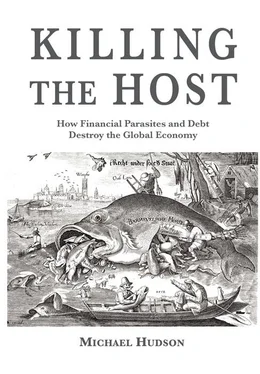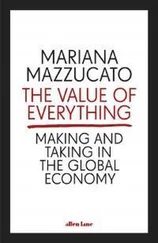As an example of the parallel struggle against landowners seeking to avoid taxes, Wells cited England’s Statutes of Mortmain (1279 and 1290) protecting the land from passing to the Church via bequest, foreclosure or sales made to avoid the epoch’s feudal duties. Throughout history there has been a constant tension between royal or public authority, and creditors or wealthy patrons seeking to indebt the land and its population to themselves so as to replace public power with their own. But whereas the great political fight of the 19 thcentury was to nationalize or tax land and natural resource rents, today’s fight must be to socialize banking and finance, which have become the ultimate recipient and hence main defender of such rents.
The actual financial crisis of 1979 was resolved in a way that led in the opposite direction from what Wells had forecast and progressive economists recommended. Instead of debtors achieving a clean slate to wipe out the debt overhead, the incoming 1981-92 Reagan-Bush administration sponsored a wave of new credit/debt, so large that interest rates declined steadily during the 1980s.
At first, this debt creation was used to inflate property and stock markets. Whereas the Vietnam War and ensuing Carter inflation (1977-80) had bid up wages and commodity prices, the subsequent neoliberal inflation bid up asset prices, reinforced by tax cuts on real estate, capital gains and the upper income brackets. This shift to regressive taxation was the reverse of what economists and futurists had expected. Instead of economies becoming more equal, they polarized increasingly between creditors and debtors.
The Reagan-Bush budget deficits quadrupled U.S. public debt, while easier credit fueled a debt overgrowth that became precisely what Wells foresaw and warned against: a dead hand of financial claims leading to the crash of 2008 and its aftermath. Contra Wells, the world barely put up a fight to break free from this dynamic. Shifting the tax burden and the cost of bank bailouts onto labor and “taxpayers” after 2008 gave Wall Street (and its counterparts abroad) the power to hold entire nations in debt.
Restructuring the financial system is hard to do when people are engulfed in a crisis, especially when they imagine that they can recover by borrowing more — and fear that there is no alternative. The reality is that history is rife with possible remedies. These remedies almost always involve debt writedowns.
There is an alternative
If we were designing a perfect world we would put the economy’s long-term interests above financial short-termism. We would organize banking and financial systems in a way to keep credit productive and within the ability of debtors to pay. In cases where predatory credit and debt exceeds the means to pay or threatens to impose austerity and debt deflation, it would be annulled.
The reason why the world isn’t pursuing such restructuring is that creditors have gained power over governments and public opinion to persuade people that it is possible for economies to continue along the present path, and even that austerity can somehow restore balance and prosperity.
Few people would expect that as financial crises intensify and polarize economies further between creditors and debtors, governments will fail to restructure the financial system. But Hayek’s hyperbole in The Road to Serfdom characterizes public planning, taxation and regulation as metaphoric serfdom. This reflects the One Percent’s fear and even hatred of democracy, progressive taxation, and public enterprise and social spending programs. In their place, Hayek’s acolytes would set economies on the road to literal debt serfdom, a state of dependency in which access to housing and education requires taking on a lifetime of debt.
The way that history was supposed to unfold was that banking would provide credit for capital investment. Public services were to be offered at falling prices (ultimately freely) to a widening population. But instead of evolving toward such “socialism,” bankers and wealthy elites found rent extraction to be their major source of gain. Calling their opposition to a government strong enough to keep them in check “libertarian,” their aim is simply to replace democratic government with planning by bankers and bondholders. To call their rent extraction and debt-financed asset-price inflation “wealth creation,” is to adopt the vocabulary of rentiers.
Ten Reforms to Restore Industrial Prosperity
1. Write down debts with a Clean Slate, or at least in keeping with the ability to pay
2. Tax economic rent to save it from being capitalized into interest payments
3. Revoke the tax deductibility of interest, to stop subsidizing debt leveraging
4. Create a public banking option
5. Fund government deficits by central banks, not by taxes to pay bondholders
6. Pay Social Security and Medicare out of the general budget
7. Keep natural monopolies in the public domain to prevent rent extraction
8. Tax capital gains at the higher rates levied on earned income
9. Deter irresponsible lending with a Fraudulent Conveyance principle
10. Revive classical value and rent theory (and its statistical categories)
1. Write down debts that block recovery
A convulsion of bankruptcy is the price to be paid for the financial sector’s sabotage of the tax system and regulatory capture of oversight agencies. Chapter 9 has described how most observers in 2008 saw that over-lending for junk mortgages had caused a bubble (asset-price inflation), and urged that debts should be scaled back to the ability to be paid ( viz . § 9 below). Such writedowns in 2008 would have avoided the widespread foreclosures that threw ten million homes onto the market at distress prices. Banks opposed such writedowns because this would have imposed losses on themselves, their bondholders and other financial players.
The Federal Reserve created enough monetary reserves for the banks to make up for their losses, but nothing to bail out homeowners. No pressure was exerted to take “troubled” (that is, overly aggressive and predatory) banks public or prosecute their officers for the mortgage frauds and underwriting frauds that were part and parcel of the crash. The FDIC was prepared to do this with Citigroup in 2008, using the bank’s surviving reserves to cover the claims of insured depositors — as distinct from stockholders, bondholders and uninsured counterparties. But it was blocked by the Treasury.
In addition to creating money directly for banks to borrow as reserves (earning a “free” interest markup), the Fed sought to re-inflate the real estate market so that bank mortgages could recover their price levels. Banks refrained from foreclosing on homes in arrears largely to keep Fannie-Mae-insured loans on their books, adding late fees and penalties to their interest charges against mortgage debtors.
Bankers depict even a partial debt writedown as threatening anarchy — their euphemism for having to take a loss when the system they designed and deregulated goes bust. But the alternative to writedowns is financial breakdown and impoverishment. A Clean Slate would make a public option for banking easier to introduce. This would help banks evolve into public utilities. It also would facilitate the rent taxes that 19 th-century free market reformers intended.
Trying to save appearances by keeping bad debts on the books has led to debt deflation gnawing into consumer demand and business investment. So we are left with the inconvenient truth that if financial claims are not annulled, the result must be an increasingly top-heavy oligarchy imposing chronic austerity, making it even harder to pay down the debt burden.
2. Tax economic rent to save it from being capitalized into interest payments
Читать дальше












